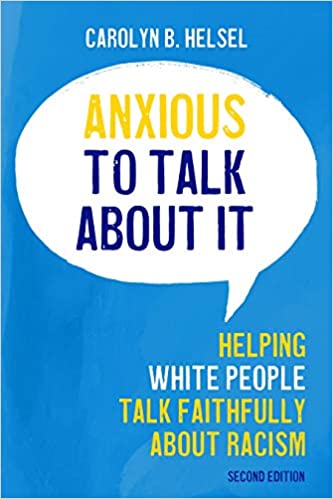by Carolyn Helsel – Chalice Press

Learn more and purchase here:
In a new season of civil unrest and activism around racism, white people are still anxious to talk about race. In this updated version of the popular 2018 release, Carolyn Helsel offers 30% new content to contextualize the conversation for this new season of the racial justice movement. This new edition includes an updated introduction, fresh stories reflecting current events, new research, and tips for parents and teachers. Anxious to Talk about It helps whites better understand and embrace their feelings of anxiety, shame, and guilt, and work through them so that they can join conversations with more courage and confidence. Reflection questions close each chapter.
“Anxious to Talk about It invites white people to recognize and relinquish racist ways, however subconscious, subtle, or insidious.”–Gerald C. Liu, Princeton Theological Seminary
“From guilt and shame to healthy white identity, Helsel has brought us a much-needed guide to white self-awareness on the switchback-ridden journey to becoming anti-racist.” –Sharon E. Watkins, Former General Minister and President, Christian Church (Disciples of Christ)
“‘I’m not a racist,’ you may be thinking. ‘I’m not in the KKK and I don’t carry a Nazi flag. Why should I read a book about race?’ Carolyn Helsel’s book will answer that question, and in the process, you’ll become not just a better white person, but a better, more mature, more caring human being.”–Brian D. McLaren, author of Faith after Doubt
“An honest, courageous, and thoughtful approach in engaging whites who are anxious to talk about race and racism. Beware (white) readers: you will meet the truth and the truth will set you free!’”–Luke A. Powery, Dean, Duke University Chapel
“Challenging, encouraging, and always faithful. A must-read for anyone desiring to discover how to live a spiritual life of self-discovery in the 21st cnetury.”-Jimmie Hawkins, Director of the Presbyterian Church (USA) Office of Public Witness & United Nations
“Helsel wades right into the thicket of emotions that accompany white fragility. This volume is packed with stories that need to be heard if America is ever going to live out a new story concerning race.”–Donyelle McCray, Yale Divinity School
